Scorecard Data Sources
Harness IDP allows you to integrate various data sources, such as GitHub, GitLab, Bitbucket, Azure DevOps, and many more, to collect specific data points for each software component. Once a data source is enabled, you can use them to create checks to be used in scorecards.
Custom Checks
You can create custom checks to evaluate data points from different data sources and use them in scorecards. Follow the given steps to create custom checks:
- In your Harness IDP account, navigate to Configure → Scorecards.
- On the Scorecards page, go to the Checks tab and select Create Custom Check in the top-right corner.
- On the Create Check page, add a name and description for your check. You can also add tags.
- Under Rules Configuration, you can add basic rules and advanced rules. See Rules Configuration for details.
- (Optional) Add a Rule Description for each rule to provide context and clarify what the rule checks.
- Click "Save changes" to save the check and its rule configuration.
Rules Configuration
Harness IDP provides two modes for configuring rules in your custom checks: Basic and Advanced. Each mode is designed to cater to different levels of complexity.
Basic Rules Configuration
The Basic mode offers a user-friendly interface for creating simple rule expressions.
- No Nested Operations: Basic mode does not support nested operations, keeping the configuration straightforward.
- Multiple Rules: You can add multiple rules and define how they should be evaluated together.
- Operation Between Rules: Choose between All Of (Performs AND operation) and Any Of (Performs OR operation):
- All Of (Performs AND operation): All rules must be satisfied for the check to pass.
- Any Of (Performs OR operation): At least one rule must be satisfied for the check to pass.
Mode Components:
Each rule in Basic mode consists of four components:
- Data Source: Select the data source you want to evaluate (e.g., GitHub, GitLab, Bitbucket, PagerDuty, etc.).
- Data Point: Choose the data point from the selected data source (e.g., repository name, branch protection status, number of open issues, etc.).
- Operator: Select the comparison operator (e.g., equals, not equals, greater than, less than, contains, etc.).
- Value: Specify the value to compare against.
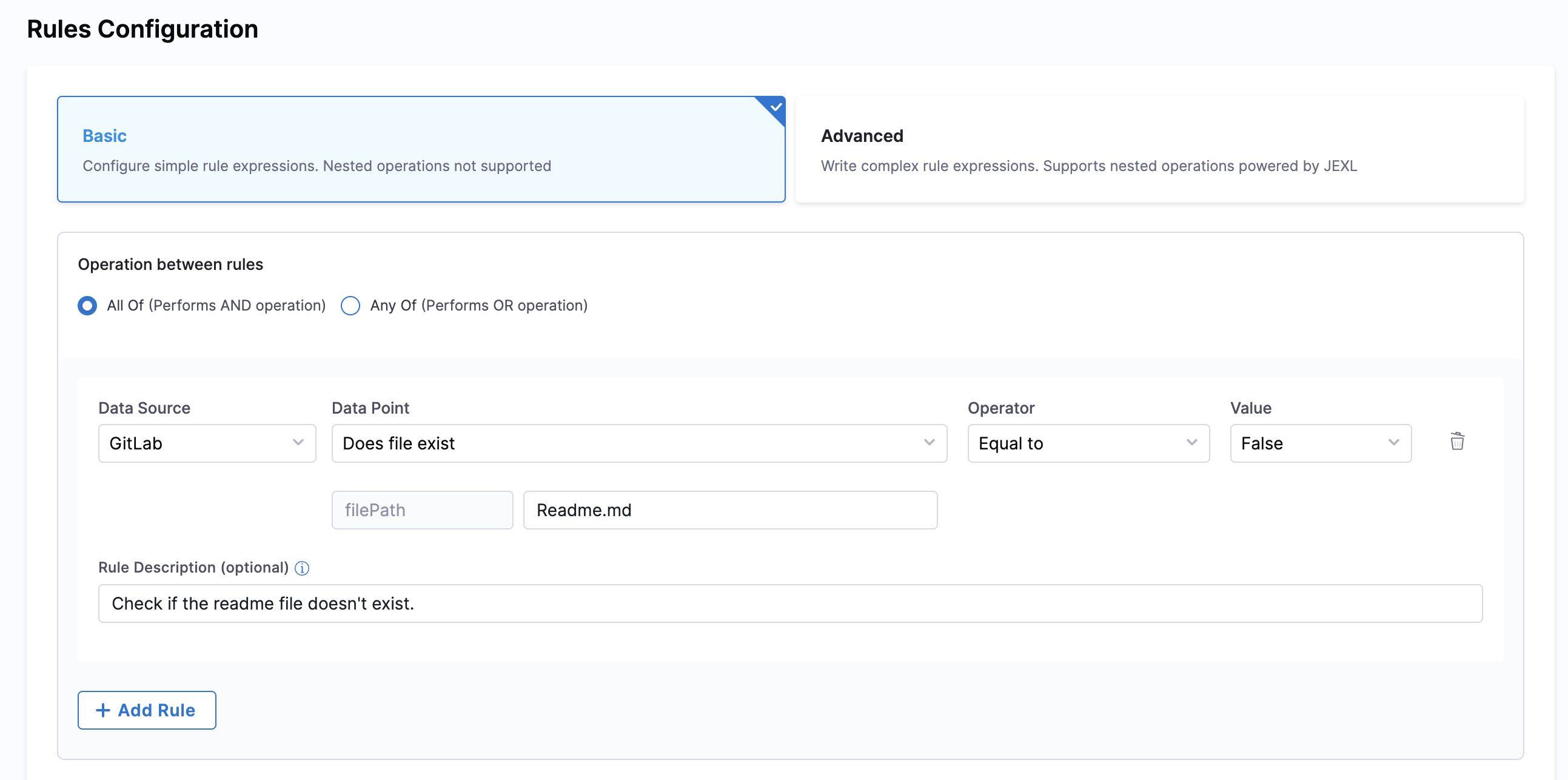
Example:
Let's create a simple check to ensure a repository has branch protection enabled:
- Operation Between Rules: Select All Of (AND operation)
- Rule Configuration:
- Data Source:
Bitbucket - Data Point:
Is Branch Protected - Operator:
Equals - Value:
true - Rule Description: "Ensure main branch is protected"
- Data Source:
This basic rule checks if the main branch has protection enabled in Bitbucket.
Advanced Rules Configuration
The Advanced mode provides a powerful Rules Expression Editor that allows you to write complex rule expressions using JEXL (Java Expression Language).
- JEXL-Powered: Write complex rule expressions using JEXL syntax, which supports nested operations, conditional logic, and advanced operators. Go to JEXL Reference for more details.
- Expression Validation: Built-in JEXL validation ensures your expressions are syntactically correct before saving.
- Generate Rule: Use the + Generate Rule button to quickly insert rule templates or snippets.
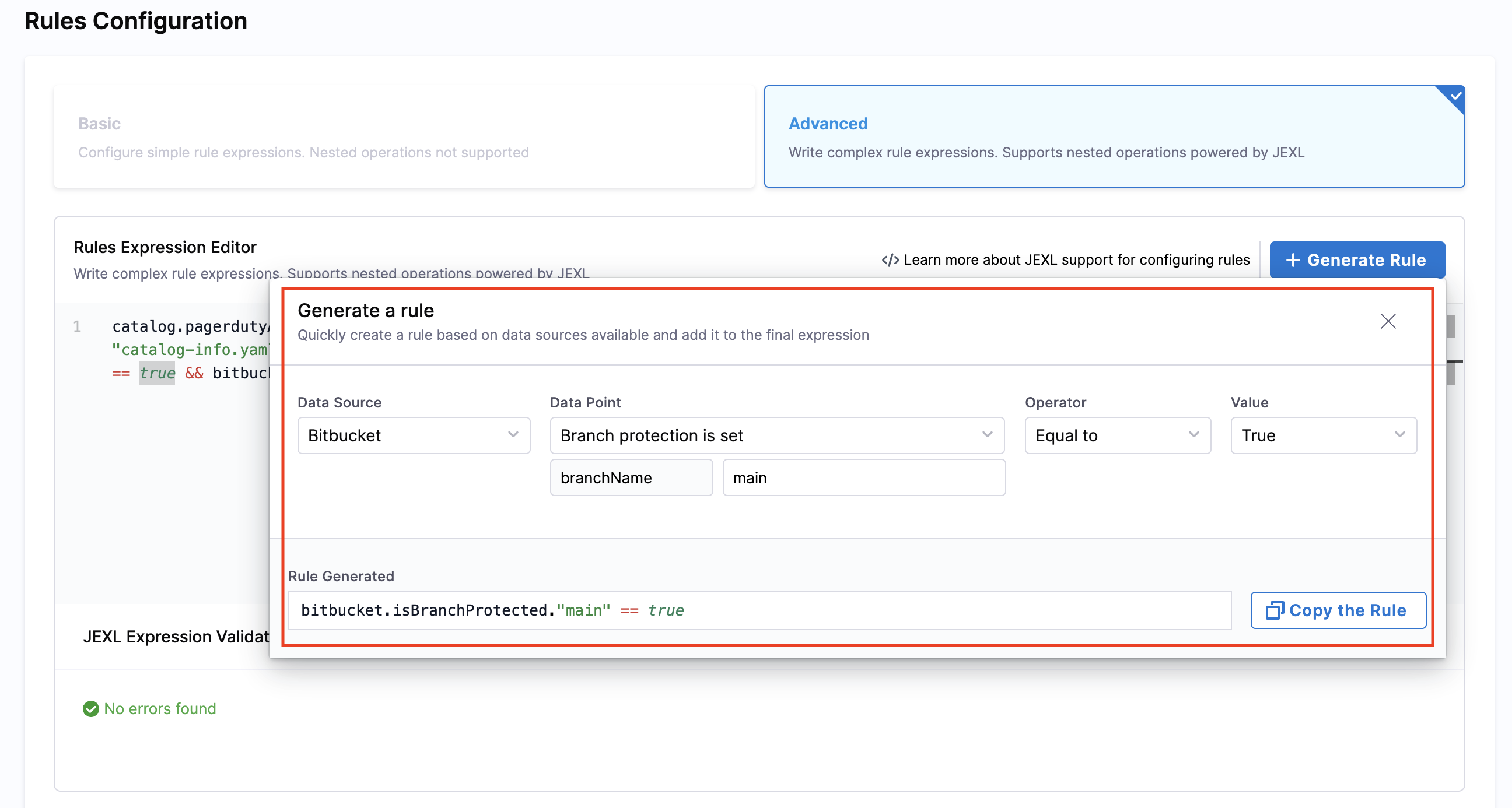
Mode Components:
- Rules Expression Editor: The editor provides a text area where you can write your JEXL expressions. The expressions can reference data points from various data sources and apply complex logic to evaluate them.
- JEXL Expression Validation: After writing your expression, click the Validate JEXL button to check if your syntax is correct. The validation feedback will appear below the editor, helping you identify and fix any errors before saving the check.
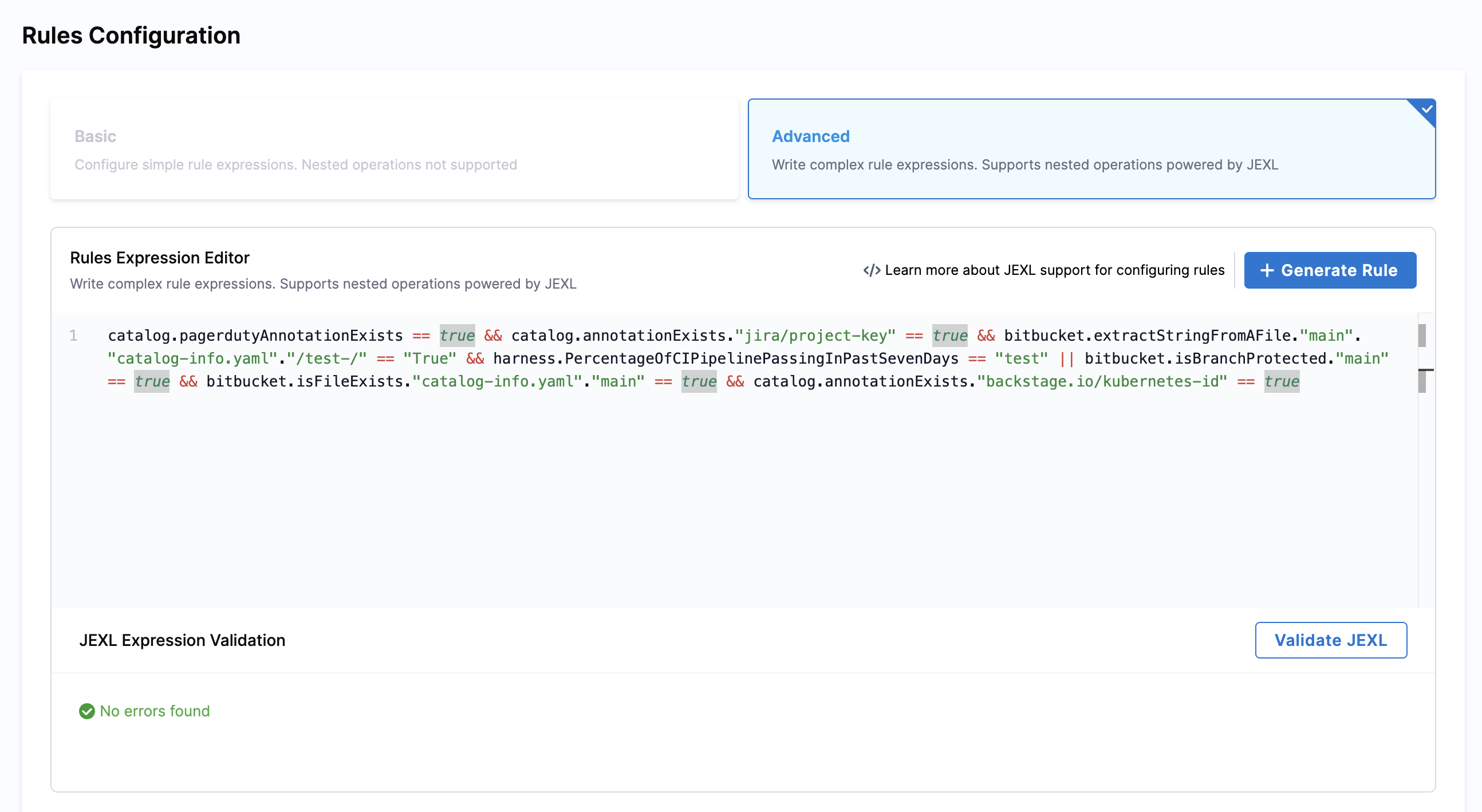
Example:
Here's a complex check that validates multiple conditions across different data sources:
catalog.pagerdutyAnnotationExists == true &&
catalog.annotationExists."jira/project-key" == true &&
bitbucket.extractStringFromAFile."main"."catalog-info.yaml"."/test-/" == "True" &&
harness.PercentageOfCIPipelinePassingInPastSevenDays == "test" &&
bitbucket.isBranchProtected."main" == true &&
bitbucket.isFileExists."catalog-info.yaml"."main" == true &&
catalog.annotationExists."backstage.io/kubernetes-id" == true
This advanced rule checks if:
- PagerDuty annotation exists in the catalog
- Jira project key annotation is present
- A specific string pattern exists in the catalog-info.yaml file
- CI pipeline success rate meets requirements
- Main branch is protected in Bitbucket
- catalog-info.yaml file exists in the main branch
- Kubernetes ID annotation is configured
Switching from Advanced to Basic mode:
- JEXL validation occurs automatically
- Switching is blocked if the expression is invalid or contains mixed
&&and||operators - Allowed:
A && B && CorA || B || C(only AND or OR operators) - Not Allowed:
A && B || C(mixed AND/OR operators)
Additional Notes:
- There's a tab called Data Sources available in Scorecards page to check for supported data sources and the corresponding data points.
- The Git (GitHub, GitLab, Bitbucket) datasources doesn't support monorepos.
Supported Operators
We support the following regex operators as Operators for all the Data Points.
- Less Than
- Less than or equal to
- Greater than
- Greater than or equal to
- Equal to
- Not equal to
- In or Match
- Not-In or Not-Match
- Starts With
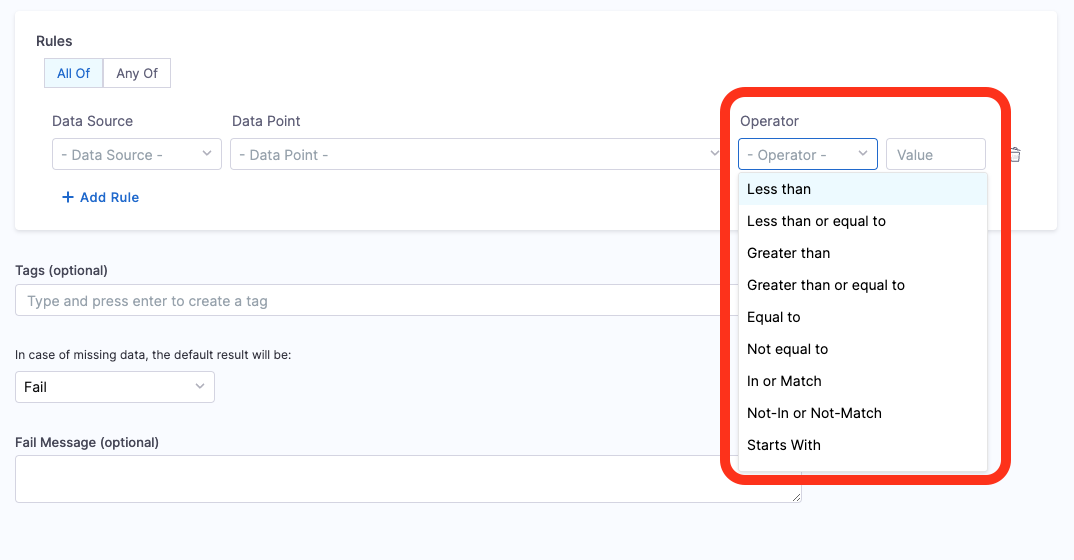
Support for catalog-info.yaml metadata as inputs.
Users can now use all the entity definition from the catalog-info.yaml or from additional properties ingested using APIs as input variable(JEXL format) in Scorecard Checks. For example, <+metadata.testCoverageScore>, <+metadata.annotations['backstage.io/techdocs-ref']>. Checks e.g., <+metadata.harnessData.name> will fetch the value for the branch in the following YAML as catalog-info.yaml.
...
metadata:
name: idp-module
harnessData:
name: idp-module-prod
path: idp
priority: P0,P1
annotations:
jira/project-key: IDP
...
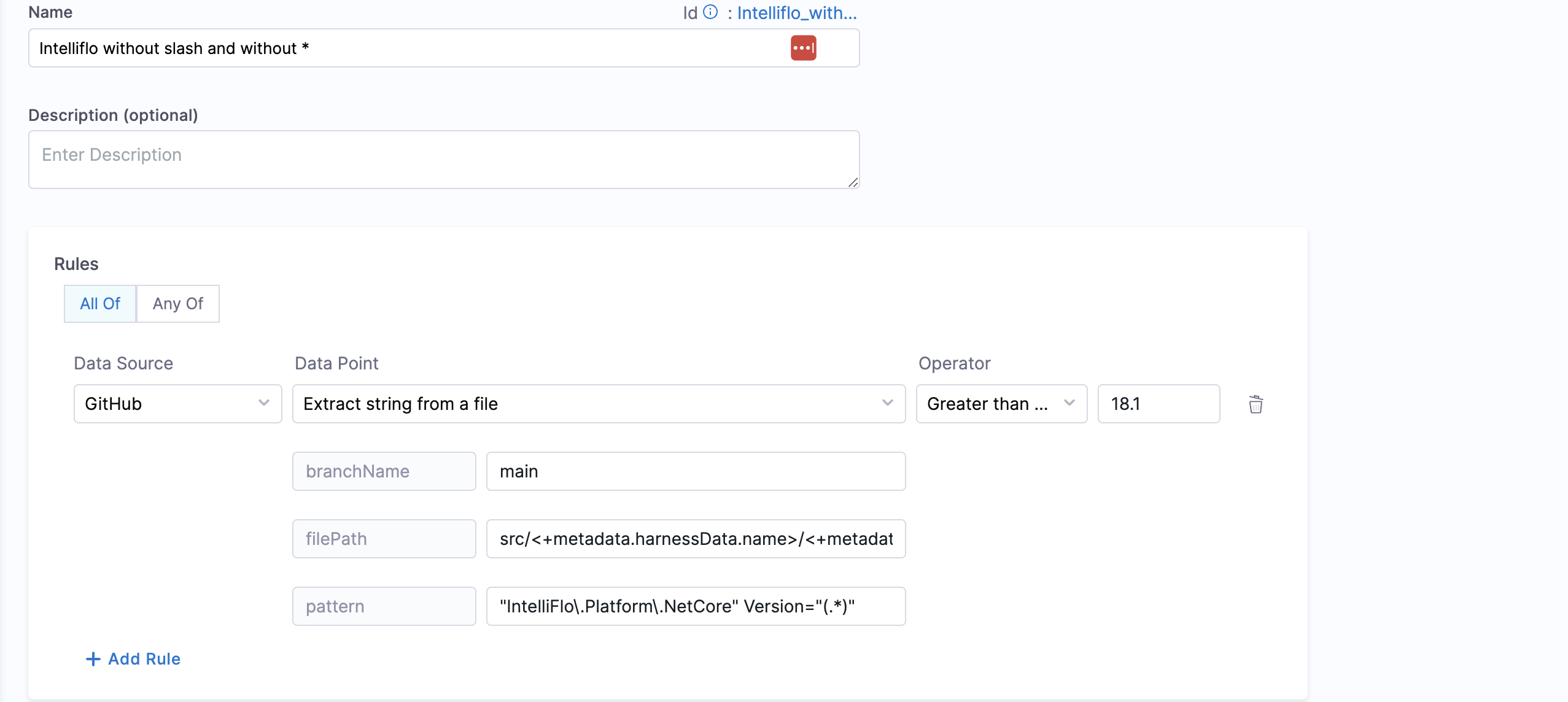
Few datasources like PagerDuty, Kubernetes are dependent on the Plugins to fetch data using the annotations meant for the plugins in catalog-info.yaml as well as the proxy defined in the plugins section.
GitHub
The following Data Points are available for GitHub Data Source.
- Branch Protection
- Objective: Ensure that branch protection rules disallow force push and delete.
- Calculation Method: Fetch
backstage.io/source-locationannotation from the catalog YAML file to find repository details and verify the branch protection rules. - Prerequisites: GitHub Connector with Admin access. Provide suitable
backstage.io/source-locationannotation if the catalog YAML file is present outside the source GitHub repository.

Example YAML
kind: "Component"
apiVersion: "backstage.io/v1alpha1"
metadata:
name: order-service
annotations:
backstage.io/source-location: 'url:https://github.com/kubernetes/kubernetes/tree/master'
...
spec:
...
- File Existence
- Objective: Verify the existence of a specified file in the repository.
- Calculation Method: Use the
backstage.io/source-locationannotation to locate the repository and check for the file’s presence. Make sure to mention the filename with extension or relative path from the root folder (e.g.: README.md or docs/README.md) in the conditional input field. - Prerequisites: Provide suitable
backstage.io/source-locationannotation if the catalog YAML file is present outside the source GitHub repository.

Example YAML
kind: "Component"
apiVersion: "backstage.io/v1alpha1"
metadata:
name: order-service
annotations:
backstage.io/source-location: 'url:https://github.com/kubernetes/kubernetes/tree/master'
...
spec:
...
- Mean Time to Merge Pull Request
- Objective: Calculate the average time taken to merge the last 100 pull requests.
- Calculation Method: Retrieve repository details using
backstage.io/source-locationand calculate the average merge time. - Prerequisites: Provide suitable
backstage.io/source-locationannotation if the catalog YAML file is present outside the source GitHub repository. Make sure to mention the branch name in the conditional input field.

Example YAML
kind: "Component"
apiVersion: "backstage.io/v1alpha1"
metadata:
name: order-service
annotations:
backstage.io/source-location: 'url:https://github.com/kubernetes/kubernetes/tree/master'
...
spec:
...
- Average time to complete successful workflow runs (in minutes)
- Objective: Calculate the average time taken to complete successful workflow runs (in minutes).
- Calculation Method: Fetches
backstage.io/source-locationannotation from catalog YAML file to find repository details and calculates the average time for the last 100 successful workflow runs to complete. - Prerequisites: Provide suitable
backstage.io/source-locationannotation if the catalog YAML file is present outside the source GitHub repository. Make sure to mention the workflow ID or filename in the conditional input field.
- Average time to complete workflow runs (in minutes)
- Objective: Calculate the average time taken to complete workflow runs (in minutes).
- Calculation Method: Fetches
backstage.io/source-locationannotation from catalog YAML file to find repository details and calculates the average time for the last 100 workflow runs to complete. - Prerequisites: Provide suitable
backstage.io/source-locationannotation if the catalog YAML file is present outside the source GitHub repository. Make sure to mention the workflow ID or filename in the conditional input field.
- Workflow success rate
- Objective: Calculates success rate for the given workflow.
- Calculation Method: Fetches
backstage.io/source-locationannotation from catalog YAML file to find repository details and calculates the success rate for the workflow. - Prerequisites: Provide suitable
backstage.io/source-locationannotation if the catalog YAML file is present outside the source GitHub repository. Make sure to mention the workflow ID or filename in the conditional input field.
- Workflows count
- Objective: Calculates total number of workflows.
- Calculation Method: Fetches
backstage.io/source-locationannotation from catalog YAML file to find repository details and calculates the total number of workflows - Prerequisites: Provide suitable
backstage.io/source-locationannotation if the catalog YAML file is present outside the source GitHub repository.
- Open code scanning alerts
- Objective: Calculates the total number of open alerts reported in code scanning for the given severity.
- Calculation Method: Fetches
backstage.io/source-locationannotation from catalog YAML file to find repository details and calculates the total number of open alerts reported in code scanning. - Prerequisites: GitHub Connector with read access for code scanning alerts. Provide suitable
backstage.io/source-locationannotation if the catalog YAML file is present outside the source GitHub repository. Make sure to mention the severity type in the conditional input field.
- Open Dependabot alerts
- Objective: Calculates the total number of open alerts reported by Dependabot for the given severity.
- Calculation Method: Fetches
backstage.io/source-locationannotation from catalog YAML file to find repository details and calculates the total number of open alerts reported by Dependabot. - Prerequisites: Provide suitable
backstage.io/source-locationannotation if the catalog YAML file is present outside the source GitHub repository. Make sure to mention the severity type in the conditional input field.
- Open secret scanning alerts
- Objective: Calculates the total number of open alerts reported in secret scanning.
- Calculation Method: Fetches
backstage.io/source-locationannotation from catalog YAML file to find repository details and calculates the total number of open alerts reported in secret scanning. - Prerequisites: GitHub Connector with read access for secret scanning alerts. Provide suitable
backstage.io/source-locationannotation if the catalog YAML file is present outside the source GitHub repository.
- Open pull requests by account
- Objective: Calculates the total number of open pull requests raised by the given account.
- Calculation Method: Fetches
backstage.io/source-locationannotation from catalog YAML file to find repository details and calculates the total number of open pull requests raised by account. - Prerequisites: Provide suitable
backstage.io/source-locationannotation if the catalog YAML file is present outside the source GitHub repository. Make sure to mention the username in the conditional input field.
- Extract string from a file
- Objective: Gets the string matching the pattern from given file from the branch.
- Calculation Method: If a branch name is specified, it is utilized. However, if no branch name is provided, the system retrieves information from the catalog YAML file using the
backstage.io/source-locationannotation to determine the branch name and repository details. It is essential to specify the filename with its extension or provide the relative path from the root folder (e.g., README.md or docs/README.md) in the conditional input field, also the filename can be provided as a regex pattern, example for a file path/backstage/blob/master/scripts/log-20240105.anyextensionthe regex would be/backstage/blob/master/scripts/log-20240105\..*. After fetching the file, the designated pattern is then searched within the file contents and its value is extracted and returned.
URL priority for branch name field
In some of the data points we take branchName as input, and it's an optional field in case the branch is mentioned in source-location in catalog-info.yaml. It is suggested to give a branchName in case you want to use the same for all the repositories, otherwise we use the branch name mentioned in the source-location.
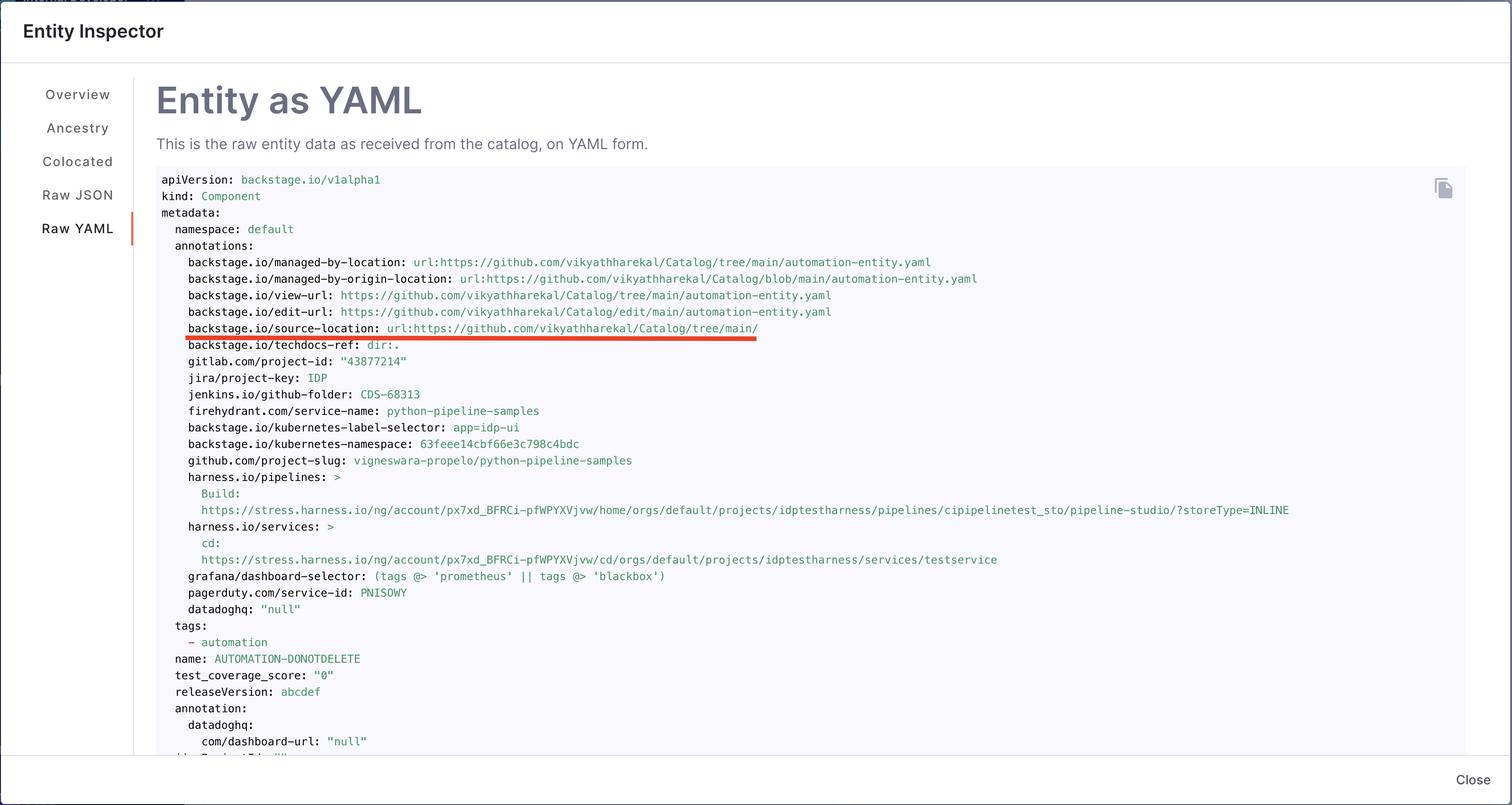
In case you mention the branchName field as a check config other than what's present in the source-location the priority order conditions could be found below.
- If it’s in both, the check configuration will take precedence.
- If it’s in only one, we’ll use that value.
- If it’s in neither, the check will fail.
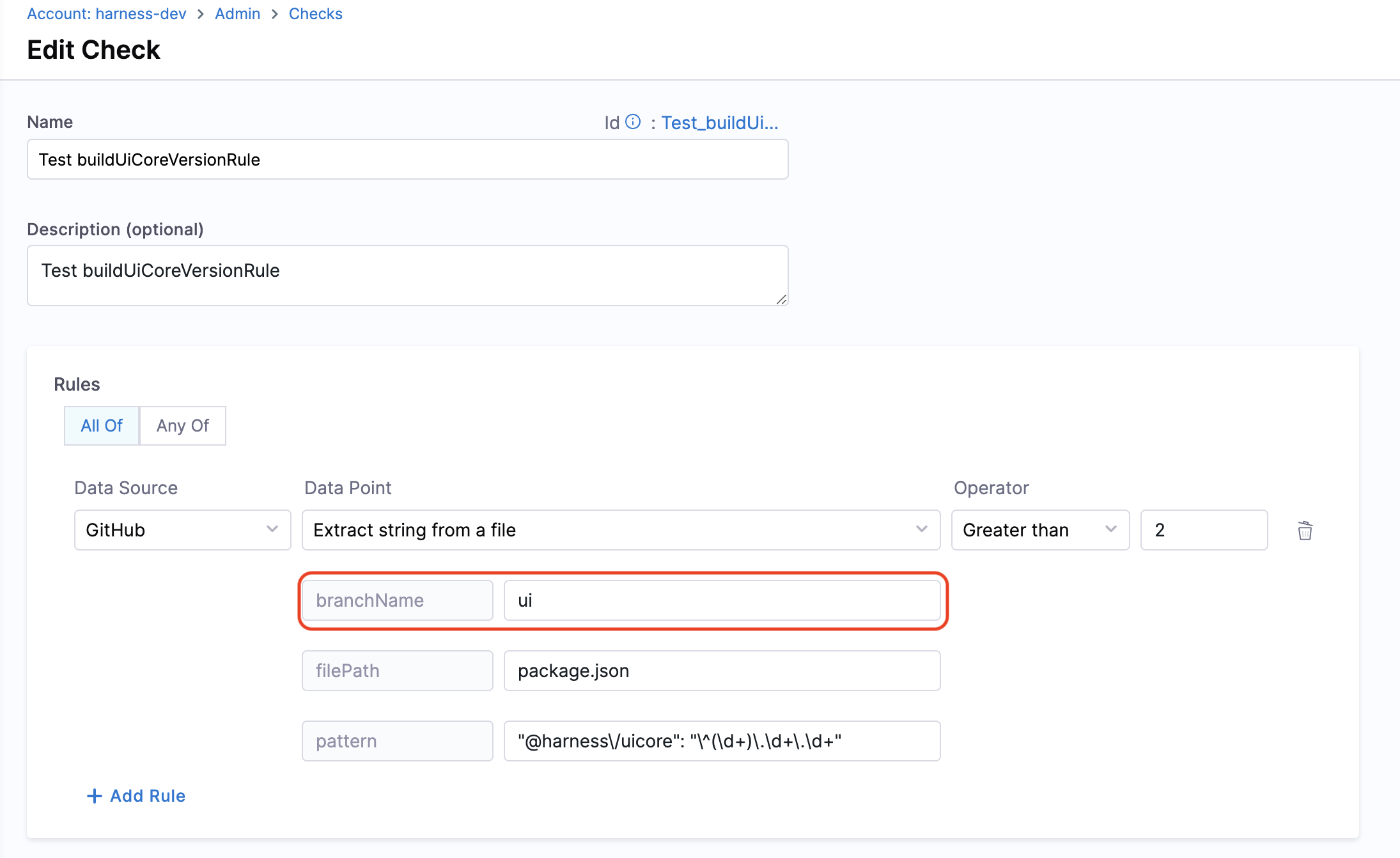
- Prerequisites: Provide suitable
backstage.io/source-locationannotation if the catalog YAML file is present outside the source GitHub repository.
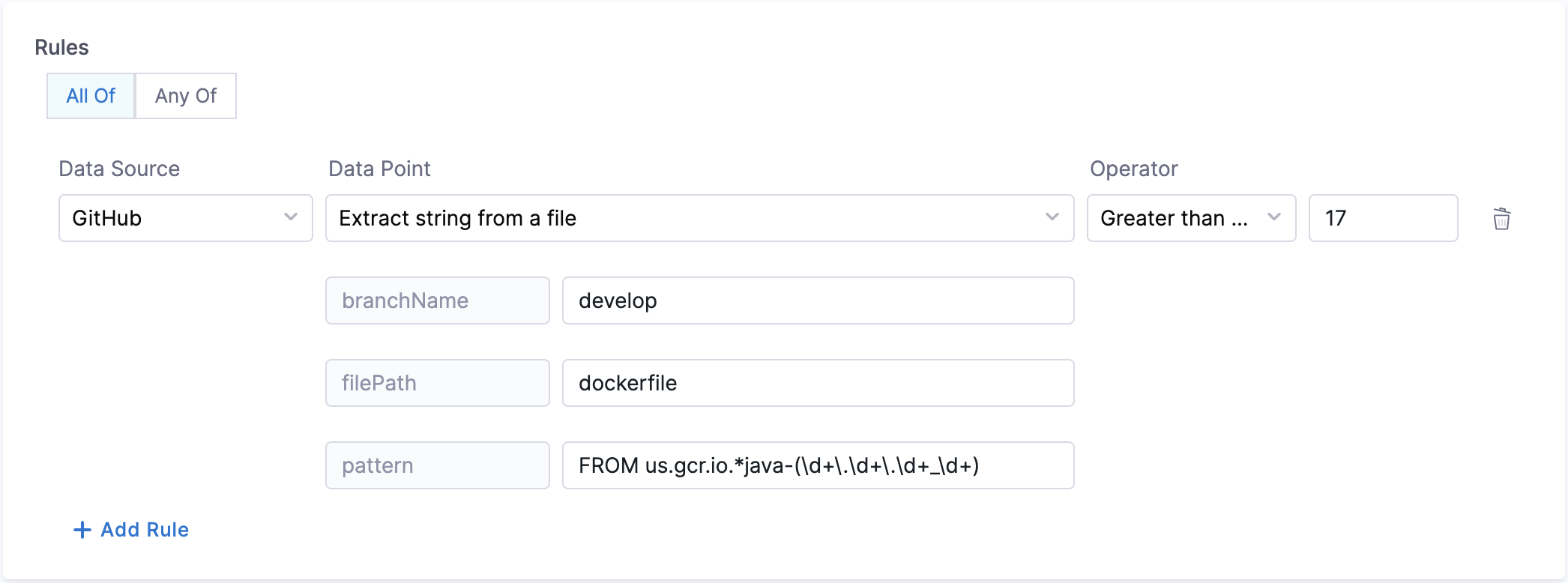
- Match string in a file
- Objective: Matches the pattern in the given file from the branch.
- Calculation Method: If a branch name is specified, it is utilized. However, if no branch name is provided, the system retrieves information from the catalog YAML file using the
backstage.io/source-locationannotation to determine the branch name and repository details. It is essential to specify the filename with its extension or provide the relative path from the root folder (e.g., README.md or docs/README.md) in the conditional input field. After fetching the file, the contents are examined to find the pattern. Returns true/false based on whether the pattern was found or not.
URL priority for branch name field
In some of the data points we take branchName as input, and it's an optional field in case the branch is mentioned in source-location in catalog-info.yaml. It is suggested to give a branchName in case you want to use the same for all the repositories, otherwise we use the branch name mentioned in the source-location.

In case you mention the branchName field as a check config other than what's present in the source-location the priority order conditions could be found below.
- If it’s in both, the check configuration will take precedence.
- If it’s in only one, we’ll use that value.
- If it’s in neither, the check will fail.

- Prerequisites: Provide suitable
backstage.io/source-locationannotation if the catalog YAML file is present outside the source GitHub repository.
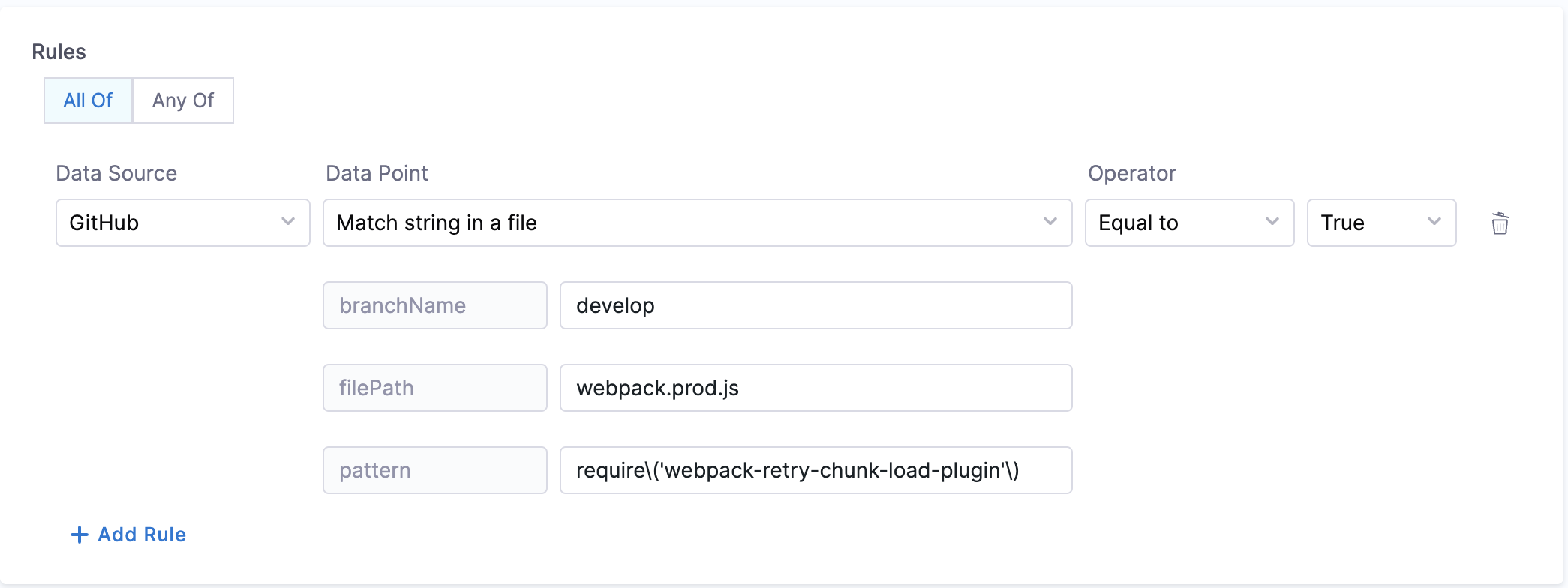
GitLab
The following Data Points are available for GitLab Data Source.
- Branch Protection
- Objective: Ensure that branch protection rules disallow force push and delete.
- Calculation Method: Fetch
backstage.io/source-locationannotation from the catalog YAML file to find repository details and verify the branch protection rules. - Prerequisites: GitLab Connector with Admin access. Provide suitable
backstage.io/source-locationannotation if the catalog YAML file is present outside the source GitLab repository.

Example YAML
kind: "Component"
apiVersion: "backstage.io/v1alpha1"
metadata:
name: order-service
annotations:
backstage.io/source-location: 'url:https://gitlab.com/kubernetes/kubernetes/tree/master'
...
spec:
...
- File Existence
- Objective: Verify the existence of a specified file in the repository.
- Calculation Method: Use the
backstage.io/source-locationannotation to locate the repository and check for the file’s presence. Make sure to mention the filename with extension or relative path from the root folder (e.g.: README.md or docs/README.md) in the conditional input field. - Prerequisites: Provide suitable
backstage.io/source-locationannotation if the catalog YAML file is present outside the source GitLab repository.

Example YAML
kind: "Component"
apiVersion: "backstage.io/v1alpha1"
metadata:
name: order-service
annotations:
backstage.io/source-location: 'url:https://gitlab.com/kubernetes/kubernetes/tree/master'
...
spec:
...
- Mean Time to Merge Pull Request
- Objective: Calculate the average time taken to merge the last 100 pull requests.
- Calculation Method: Retrieve repository details using
backstage.io/source-locationand calculate the average merge time. - Prerequisites: Provide suitable
backstage.io/source-locationannotation if the catalog YAML file is present outside the source GitLab repository. Make sure to mention the branch name in the conditional input field.

Example YAML
kind: "Component"
apiVersion: "backstage.io/v1alpha1"
metadata:
name: order-service
annotations:
backstage.io/source-location: 'url:https://gitlab.com/kubernetes/kubernetes/tree/master'
...
spec:
...
- Extract string from a file
- Objective: Gets the string matching the pattern from given file from the branch.
- Calculation Method: If a branch name is specified, it is utilized. However, if no branch name is provided, the system retrieves information from the catalog YAML file using the
backstage.io/source-locationannotation to determine the branch name and repository details. It is essential to specify the filename with its extension or provide the relative path from the root folder (e.g., README.md or docs/README.md) in the conditional input field. After fetching the file, the designated pattern is then searched within the file contents and its value is extracted and returned.
URL priority for branch name field
In some of the data points we take branchName as input, and it's an optional field in case the branch is mentioned in source-location in catalog-info.yaml. It is suggested to give a branchName in case you want to use the same for all the repositories, otherwise we use the branch name mentioned in the source-location.

In case you mention the branchName field as a check config other than what's present in the source-location the priority order conditions could be found below.
- If it’s in both, the check configuration will take precedence.
- If it’s in only one, we’ll use that value.
- If it’s in neither, the check will fail.

- Prerequisites: Provide suitable
backstage.io/source-locationannotation if the catalog YAML file is present outside the source GitHub repository.

- Match string in a file
- Objective: Matches the pattern in the given file from the branch.
- Calculation Method: If a branch name is specified, it is utilized. However, if no branch name is provided, the system retrieves information from the catalog YAML file using the
backstage.io/source-locationannotation to determine the branch name and repository details. It is essential to specify the filename with its extension or provide the relative path from the root folder (e.g., README.md or docs/README.md) in the conditional input field. After fetching the file, the contents are examined to find the pattern. Returns true/false based on whether the pattern was found or not.
URL priority for branch name field
In some of the data points we take branchName as input, and it's an optional field in case the branch is mentioned in source-location in catalog-info.yaml. It is suggested to give a branchName in case you want to use the same for all the repositories, otherwise we use the branch name mentioned in the source-location.

In case you mention the branchName field as a check config other than what's present in the source-location the priority order conditions could be found below.
- If it’s in both, the check configuration will take precedence.
- If it’s in only one, we’ll use that value.
- If it’s in neither, the check will fail.

- Prerequisites: Provide suitable
backstage.io/source-locationannotation if the catalog YAML file is present outside the source GitHub repository.

Bitbucket
The following Data Points are available for Bitbucket Data Source.
- Branch Protection
- Objective: Ensure that branch protection rules disallow force push and delete.
- Calculation Method: Fetch
backstage.io/source-locationannotation from the catalog YAML file to find repository details and verify the branch protection rules. - Prerequisites: Bitbucket Connector with Admin access. Provide suitable
backstage.io/source-locationannotation if the catalog YAML file is present outside the source Bitbucket repository.

Example YAML
kind: "Component"
apiVersion: "backstage.io/v1alpha1"
metadata:
name: order-service
annotations:
backstage.io/source-location: 'url:https://bitbucket.org/kubernetes/kubernetes/tree/master'
...
spec:
...
- Mean Time to Merge Pull Request
- Objective: Calculate the average time taken to merge the last 100 pull requests.
- Calculation Method: Retrieve repository details using
backstage.io/source-locationand calculate the average merge time. - Prerequisites: Provide suitable
backstage.io/source-locationannotation if the catalog YAML file is present outside the source Bitbucket repository. Make sure to mention the branch name in the conditional input field.

Example YAML
kind: "Component"
apiVersion: "backstage.io/v1alpha1"
metadata:
name: order-service
annotations:
backstage.io/source-location: 'url:https://bitbucket.org/kubernetes/kubernetes/tree/master'
...
spec:
...
- Extract string from a file
- Objective: Gets the string matching the pattern from given file from the branch.
- Calculation Method: If a branch name is specified, it is utilized. However, if no branch name is provided, the system retrieves information from the catalog YAML file using the
backstage.io/source-locationannotation to determine the branch name and repository details. It is essential to specify the filename with its extension or provide the relative path from the root folder (e.g., README.md or docs/README.md) in the conditional input field. After fetching the file, the designated pattern is then searched within the file contents and its value is extracted and returned.
URL priority for branch name field
In some of the data points we take branchName as input, and it's an optional field in case the branch is mentioned in source-location in catalog-info.yaml. It is suggested to give a branchName in case you want to use the same for all the repositories, otherwise we use the branch name mentioned in the source-location.

In case you mention the branchName field as a check config other than what's present in the source-location the priority order conditions could be found below.
- If it’s in both, the check configuration will take precedence.
- If it’s in only one, we’ll use that value.
- If it’s in neither, the check will fail.

- Prerequisites: Provide suitable
backstage.io/source-locationannotation if the catalog YAML file is present outside the source GitHub repository.

- Match string in a file
- Objective: Matches the pattern in the given file from the branch.
- Calculation Method: If a branch name is specified, it is utilized. However, if no branch name is provided, the system retrieves information from the catalog YAML file using the
backstage.io/source-locationannotation to determine the branch name and repository details. It is essential to specify the filename with its extension or provide the relative path from the root folder (e.g., README.md or docs/README.md) in the conditional input field. After fetching the file, the contents are examined to find the pattern. Returns true/false based on whether the pattern was found or not.
URL priority for branch name field
In some of the data points we take branchName as input, and it's an optional field in case the branch is mentioned in source-location in catalog-info.yaml. It is suggested to give a branchName in case you want to use the same for all the repositories, otherwise we use the branch name mentioned in the source-location.

In case you mention the branchName field as a check config other than what's present in the source-location the priority order conditions could be found below.
- If it’s in both, the check configuration will take precedence.
- If it’s in only one, we’ll use that value.
- If it’s in neither, the check will fail.

- Prerequisites: Provide suitable
backstage.io/source-locationannotation if the catalog YAML file is present outside the source GitHub repository.

- File Existence
- Objective: Verify the existence of a specified file in the repository.
- Calculation Method: Use the
backstage.io/source-locationannotation to locate the repository and check for the file’s presence. Make sure to mention the filename with extension or relative path from the root folder (e.g.: README.md or docs/README.md) in the conditional input field.
URL priority for branch name field
In some of the data points we take branchName as input, and it's an optional field. It is suggested to give a branchName in case you want to use the same for all the repositories, otherwise we use the default branch for the repository mentioned in source-location.

In case you mention the branchName field as a check config other than what's present in the source-location the priority order conditions could be found below.
- If it’s in both, the check configuration will take precedence.
- If it’s in only one, we’ll use that value.
- If it’s in neither, then we will use the default branch for the repository used in
source-location.

:::
Example YAML
kind: "Component"
apiVersion: "backstage.io/v1alpha1"
metadata:
name: order-service
annotations:
backstage.io/source-location: 'url:https://gitlab.com/kubernetes/kubernetes/tree/master'
...
spec:
...
Harness
Pre-Requisites
-
For the functioning of Harness Data Source related checks, the Harness CI/CD plugin should be configured with annotations in catalog info YAML,
harness.io/pipelinesandharness.io/services. -
harness.io/pipelines: The pipeline URL is used as input, and it should only be fetched from under Projects and not from specific modules.
Here's an example of the URL input: https://app.harness.io/ng/account/account_id/home/orgs/org_id/projects/project_id/pipelines/pipeline_id
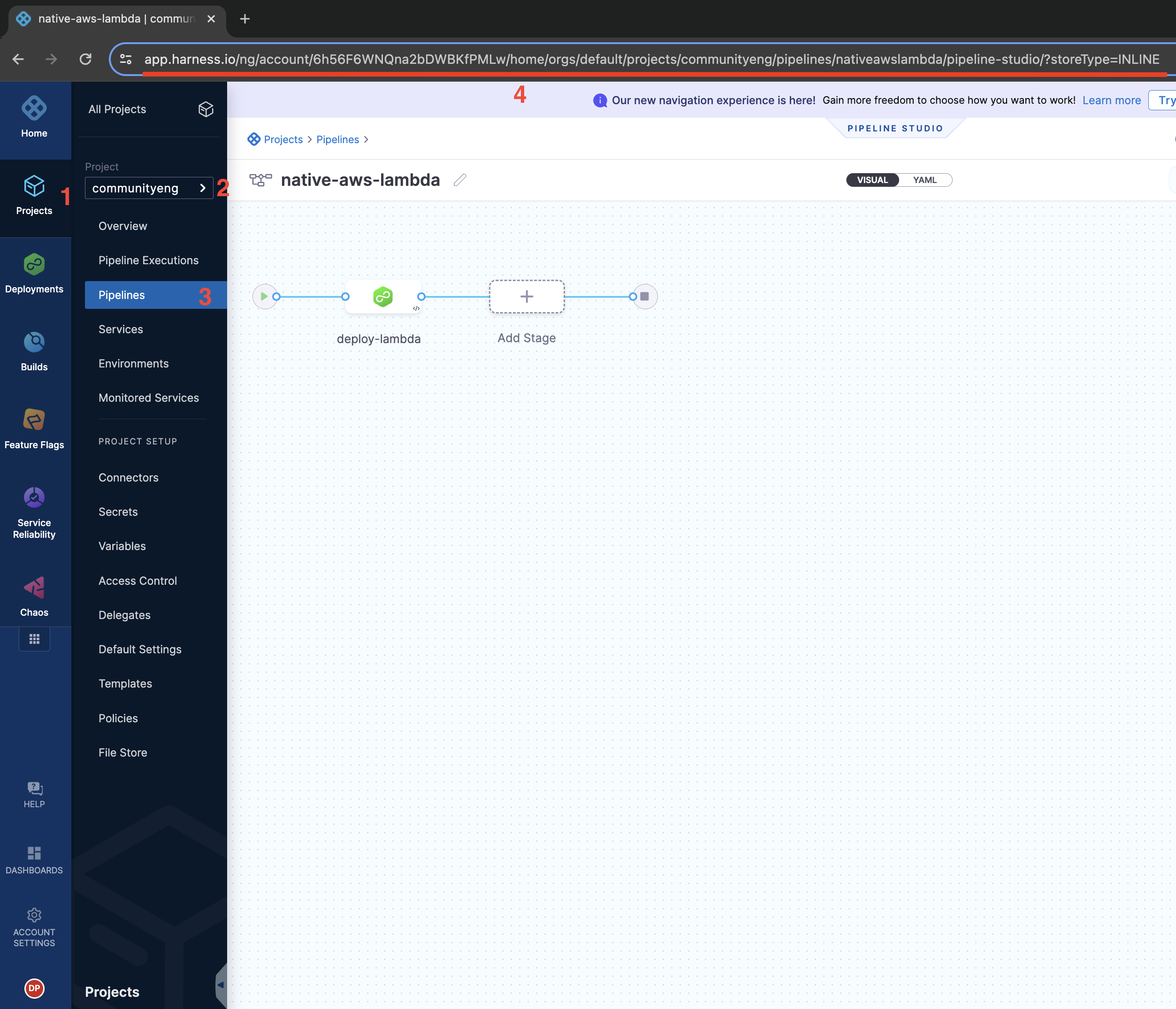
harness.io/services(Optional): The URL for the Service should be used as an input, and it should only be fetched from under Projects and not from specific modules.
Here's an example of the URL input: https://app.harness.io/ng/account/account_id/home/orgs/org_id/projects/project_id/services/service_id
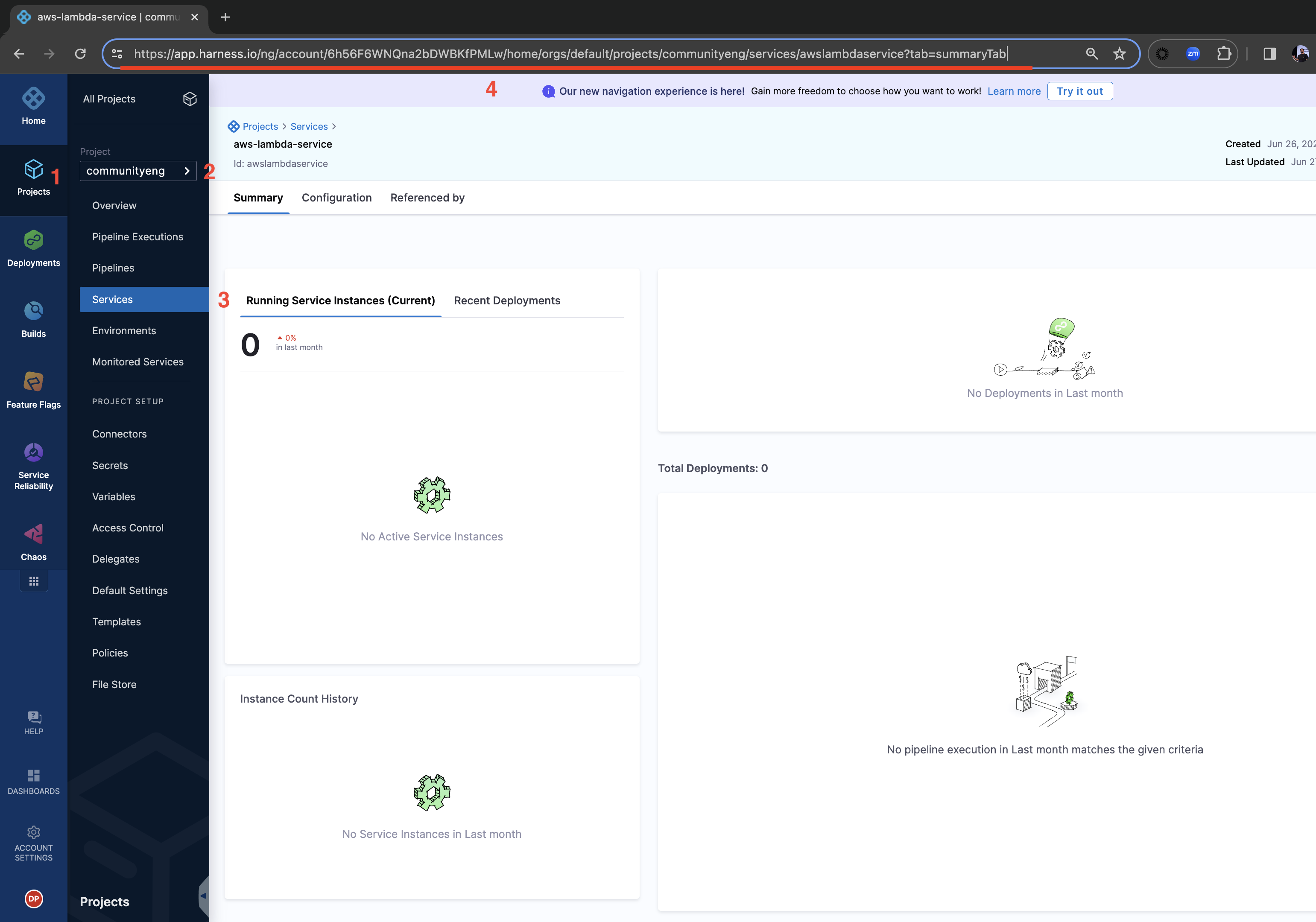
In the Harness Data source, the first pipeline URL from harness.io/pipelines is considered for score computation and similarly, the first service URL from harness.io/services is considered if provided.
The following Data Points are available for Harness Data Source.
- CI Pipeline success rate (last 7 days):
- Objective: Used for creating rules that will check the success percent of the ci-pipeline in the past 7 days. (This data point is only applicable for CI Pipelines).
- Calculation Method: The success rate is calculated only on CI Pipeline that we provide in catalog info YAML with annotation is considered for evaluating the check.

- Policy evaluation successful:
- Objective: This data point can be used for creating a rule that will check if the policy evaluation is successful in pipelines. (This data point is applicable to both CI and CD Pipelines but is evaluated based on the annotation provided i.e., in-case only
harness.io/pipelinesis present score will be computed based on that)

- Tests passing on CI (boolean):
- Objective: This data point can be used for creating a rule that will check if all the test cases running the CI Pipeline are passing(not a single failing test case). (This data point is only applicable to CI Pipeline)

- STO stage added in pipeline:
- Objective: This data point can be used for creating a rule that will check if STO stage is added in the pipelines. (This data point is applicable to both CI and CD Pipelines but is evaluated based on the annotation provided i.e., in-case only
harness.io/pipelinesis present score will be computed based on that)

- Number of Active vulnerabilities STO:
- Objective: This data point can be used for creating a rule that will check the number of vulnerabilities of specified severity found by scanner tools in STO scans. You can set thresholds for critical, high, medium, or low severity vulnerabilities to ensure security standards are met.

Points to remember:-
-
In the case of CI Pipeline, the first pipeline that we provide in the annotation in catalog info YAML will be used for evaluating the rules corresponding to data points. If the rule depends on the execution of the pipeline then the latest execution of the provided CI Pipeline will be considered.
-
In the case of CD Pipeline, the latest deployment pipeline using the first service that we provide in the annotation in catalog info YAML is considered for evaluating the rules corresponding to data points.
-
If you want the score to be computed based on the data point from both CI and CD Pipelines, annotations corresponding to both should be present in the catalog YAML
Error Scenarios:
- In case the check fails, the failure summary will provide the details for the pipeline because of which the check is failing. [We can refer to the pipeline and fix the pipeline with respect to the corresponding check]
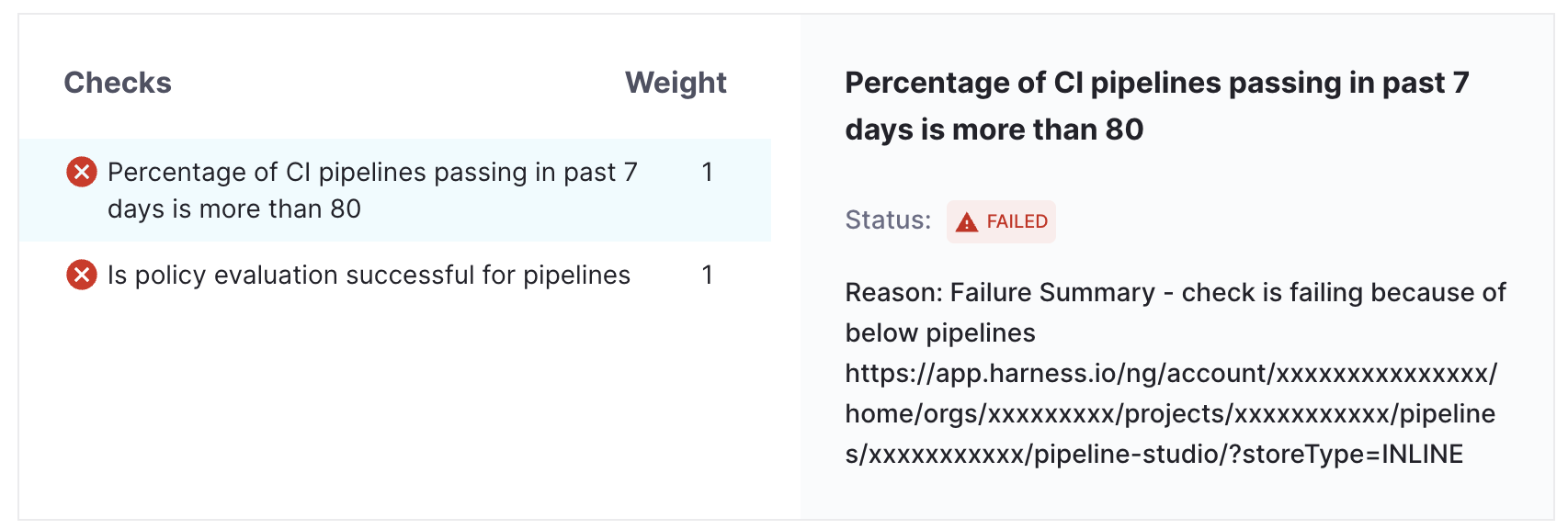
- In case if annotation is missing the catalog info YAML, we will get the failure summary for the check in order to add the annotation [We can refer to the Pre-Requisite section to add it]

- (Code) Extract string from a file
-
Objective: Gets the string matching the pattern from given file from the branch.
-
Calculation Method: If a branch name is specified, it is utilized. However, if no branch name is provided, the system retrieves information from the catalog YAML file using the backstage.io/source-location annotation to determine the branch name and repository details. It is essential to specify the filename with its extension or provide the relative path from the root folder (e.g., README.md or docs/README.md) in the conditional input field. After fetching the file, the designated pattern is then searched within the file contents and its value is extracted and returned
-
Prerequisites: Provide suitable
backstage.io/source-locationannotation if the catalog YAML file is present outside the source Harness Code repository.
- (Code) Does file exist
-
Objective: Checks if the given filename exist or not.
-
Calculation Method: Fetches
backstage.io/source-locationannotation from catalog YAML file to find repository details and find if the file is present or not. Make sure to mention the filename with extension or relative path from the root folder (e.g.: README.md or docs/README.md) in the conditional input field. -
Prerequisites: Provide suitable
backstage.io/source-locationannotation if the catalog YAML file is present outside the source Harness Code repository.
- (Code) Match string in a file
-
Objective: Matches the pattern in the given file from the branch.
-
Calculation Method: If a branch name is specified, it is utilized. However, if no branch name is provided, the system retrieves information from the catalog YAML file using the backstage.io/source-location annotation to determine the branch name and repository details. It is essential to specify the filename with its extension or provide the relative path from the root folder (e.g., README.md or docs/README.md) in the conditional input field. After fetching the file, the contents are examined to find the pattern. Returns true/false based on whether the pattern was found or not.
-
Prerequisites: Provide suitable
backstage.io/source-locationannotation if the catalog YAML file is present outside the source Harness Code repository.
Catalog
The following Data Points are available for Catalog Data Source.
- Evaluate expression (JEXL):
- Objective: Evaluate JEXL expression on the catalog YAML file.
- Calculation Method: The catalog YAML is inspected to perform custom JEXL expression and returns the evaluated data.
Example Usage:
Below is an example of catalog-info.yaml
##Example
apiVersion: backstage.io/v1alpha1
kind: Component
metadata:
name: artist-web
description: The place to be, for great artists
labels:
example.com/custom: custom_label_value
annotations:
example.com/service-discovery: artistweb
circleci.com/project-slug: github/example-org/artist-website
tags:
- java
links:
- url: https://admin.example-org.com
title: Admin Dashboard
icon: dashboard
type: admin-dashboard
spec:
type: website
lifecycle: production
owner: artist-relations-team
system: public-websites
In the above example using the Evaluate expression we can match input values for all the root fields apiVersion, kind, metadata, and spec only and the supported values under the root field.
for eg. <+metadata.name> would point to artist-db from the above example, and could be used to check the values
We only support string and key-value pair data types in JEXL, some datatype like array, list aren't supported.
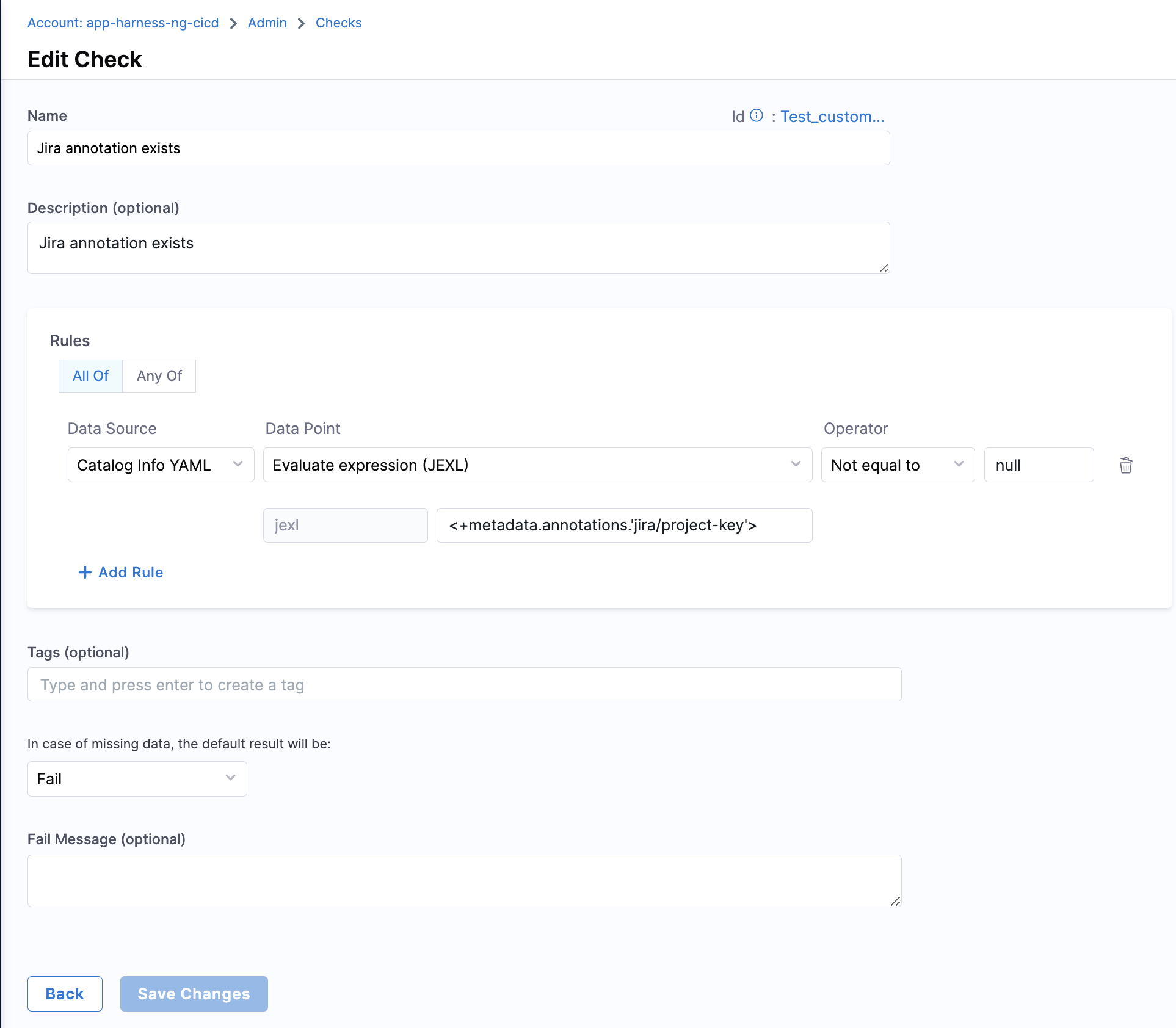
- Owner is defined:
- Objective: Checks if the catalog YAML file has the owner configured or not
- Calculation Method: The catalog YAML is inspected to check if the owner is under the spec field and the owner should not be Unknown.

Example YAML
apiVersion: backstage.io/v1alpha1
kind: Component
metadata:
...
spec:
type: service
system: order
lifecycle: experimental
owner: order-team
- Documentation Exists:
- Objective: Checks if the catalog YAML file has the annotation
backstage.io/techdocs-refconfigured or not. - Calculation Method: The catalog YAML is inspected to check if the
backstage.io/techdocs-refis present under the metadata field. - Prerequisites: The directory configured should have the
mkdocs.ymlfile and a docs directory having all the documentation in Markdown format.

Example YAML
apiVersion: backstage.io/v1alpha1
kind: Component
metadata:
name: order-service
annotations:
backstage.io/techdocs-ref: dir:.
...
spec:
...
- Pagerduty is set:
- Objective: Checks if the catalog YAML file has the annotation
pagerduty.com/service-idconfigured or not. - Calculation Method: The catalog YAML is inspected to check if the
pagerduty.com/service-idis present under the metadata field. - Prerequisites: The PagerDuty plugin needs to be configured and enabled in the admin section. Please refer here for more details.

Example YAML
kind: "Component"
apiVersion: "backstage.io/v1alpha1"
metadata:
name: order-service
annotations:
pagerduty.com/service-id: PT5ED69
...
spec:
...
- Annotation Exists:
- Objective: Checks if the catalog YAML file has a particular annotation set under
annotationfield is configured or not. - Calculation Method: The catalog YAML is inspected to check if the particular annotation is present under the metadata field.
For example, setting up the check below for the example catalog-info.yaml you could find whether the annotation jira/project-keypresent or not. In this case the check would pass as the annotation is present.

## Example catalog-info.yaml
kind: "Component"
apiVersion: "backstage.io/v1alpha1"
metadata:
name: order-service
annotations:
jira/project-key: IDP
...
spec:
...
Kubernetes
The Kubernetes datasource being dependent on the Kubernetes Plugin for annotations and proxy we only support label-selector e.g. 'backstage.io/kubernetes-label-selector': 'app=my-app,component=front-end' rest all other annotation type mentioned here are planned to be supported in the next few releases.
Also, for additional filtering we support namespace in annotation 'backstage.io/kubernetes-namespace': dice-space as well, but label-selector is mandatory.
Prerequisites:
- Plugin Configuration
- The Kubernetes plugin needs to be configured. Refer here.
The plugin provides 2 ways to authenticate - serviceAccount and Google authentication. But currently, the scorecards supports serviceAccount type authentication only.
- Entity Configuration
- There are two ways to surface Kubernetes components as part of an entity using annotations -
backstage.io/kubernetes-idandbackstage.io/kubernetes-label-selector. But currently, scorecards support backstage.io/kubernetes-label-selector annotation only.
The following Data Points are available for Kubernetes Data Source.
- Replicas Count:
- Objective: Fetches the number of replicas configured for the given service.
- Calculation Method: The label selector configured in the catalog YAML is used to identify the Kubernetes workload and the configured replica count is used. The cluster details configured in the Kubernetes plugin are used. If more than one cluster is configured, the workload search is done in each cluster and a minimum of all the replica counts is taken into consideration.
- Prerequisites: The Kubernetes plugin needs to be configured and enabled in the admin section. Refer here for more details.

- Days passed since the application was last deployed:
- Objective: Fetches the number of days since the most recent deployment was done.
- Calculation Method: The label selector configured in the catalog YAML is used to identify the
Kubernetes workloadand thelastUpdateTimeis used from the conditions section. The cluster details configured in the Kubernetes plugin are used. If more than one cluster is configured, the workload search is done in each cluster and the oldest deployment time of all is taken into consideration. - Prerequisites: The Kubernetes plugin needs to be configured and enabled in the admin section. Refer here for more details.

Jira
The following Data Points are available for Jira Data Source.
- Issues Count:
- Objective: Calculates the total number of issues for the given JQL query.
- Calculation Method: Fetches annotations from catalog YAML file to find project details and calculates number of issues. Make sure to provide JQL expression in the conditional input field.
- Open P0/P1 bugs:
issuetype = Bug AND priority in (P0, P1) AND statusCategory != Done - Features delivered (last 90 days):
issuetype in (Epic, 'New Feature') AND resolved >= -90d - Make sure to wrap words within single quotes. e.g.:
'New Feature'
- Open P0/P1 bugs:
- Prerequisites: Provide annotations like
jira/project-key(required) andjira/component(optional) in the catalog YAML file.

Example YAML
kind: "Component"
apiVersion: "backstage.io/v1alpha1"
metadata:
name: order-service
annotations:
jira/project-key: <jira-project-key>
jira/component: <jira-component>
...
spec:
...
- Mean time to resolve:
- Objective: Calculates the average time taken to resolve issues for the given JQL query.
- Calculation Method: Fetches annotations from catalog YAML file to find project details and calculates average time. Make sure to provide JQL expression in the conditional input field.
- Mean time to resolve bugs:
issuetype = Bug AND priority in (P0,P1) AND resolved >= -90d - Make sure to wrap words within single quotes. e.g.:
'New Feature'
- Mean time to resolve bugs:
- Prerequisites: Provide annotations like
jira/project-key(required) andjira/component(optional) in the catalog YAML file.

Example YAML
kind: "Component"
apiVersion: "backstage.io/v1alpha1"
metadata:
name: order-service
annotations:
jira/project-key: <jira-project-key>
jira/component: <jira-component>
...
spec:
...
- Issues Open/Close Ratio:
- Objective: Calculates the ratio between Open & Closed issues for the given JQL query.
- Calculation Method: Fetches annotations from catalog YAML file to find project details and calculates the ratio. Make sure to provide JQL expression in the conditional input field.
- Mean time to resolve bugs:
issuetype = Bug AND priority in (P0,P1) AND resolved >= -90d - Make sure to wrap words within single quotes. e.g.:
'New Feature'
- Mean time to resolve bugs:
- Prerequisites: Provide annotations like
jira/project-key(required) andjira/component(optional) in the catalog YAML file.

Example YAML
kind: "Component"
apiVersion: "backstage.io/v1alpha1"
metadata:
name: order-service
annotations:
jira/project-key: <jira-project-key>
jira/component: <jira-component>
...
spec:
...
PagerDuty
Prerequisites:
- The PagerDuty plugin must be configured and enabled in the admin section. Refer here.
The following Data Points are available for PagerDuty Data Source.
- Is on-call Set - This data point can be used for creating rules that will check if the on-call is set for a given service.

- Is Escalation Policy call - This data point can be used to create rules to check if the escalation policy is set for a given service.

- Number of incidents in the last 30 days - This data point can be used to create rules to check if the number of incidents created in the last 30 days is less than the given threshold input value.

- Average resolved time of the last 10 resolved incidents (in Minutes) - This data point can be used to create rules to check if the average resolved time for the last 10 resolved incidents (in Minutes) is less than the given provided input values.

Error Scenarios:-
- In case checks fail because of PagerDuty plugin is not enabled we will get the error message in the failure summary.
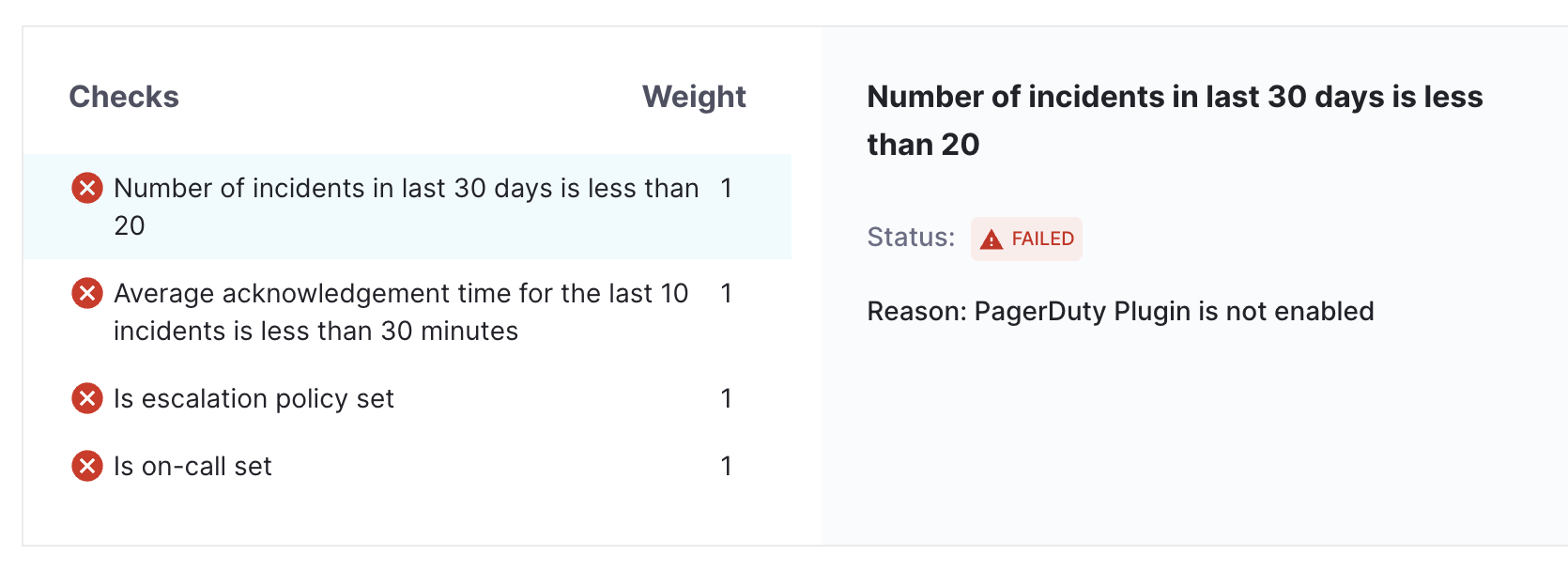
- In case of checks fail because of PagerDuty annotation is missing in catalog info YAML we will get the corresponding error message.
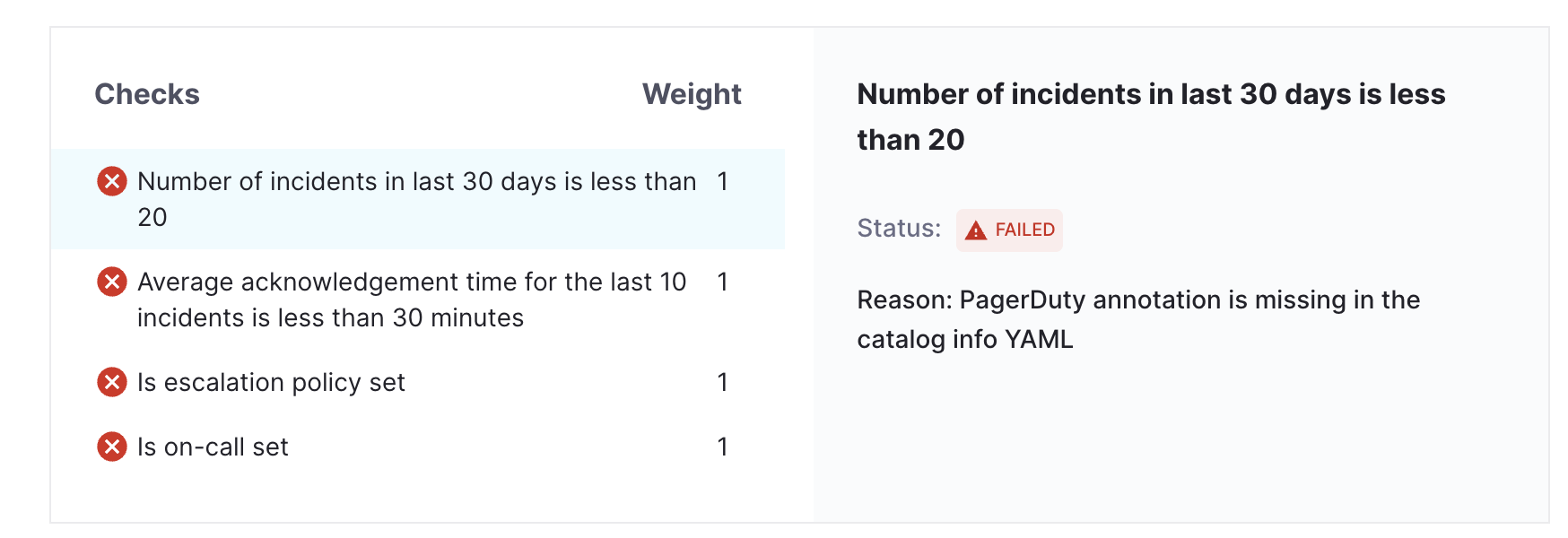
-
Now add a
tagunder which category your check belongs to, Ex. "Developer Productivity", "Software Maturity" and clickenterto add each tags. -
Now add the default result in case of missing data and Save Changes. Your checks will be added.
Checks Overview
- Once the Checks are created, you can view the list of all the checks under the Checks tab.
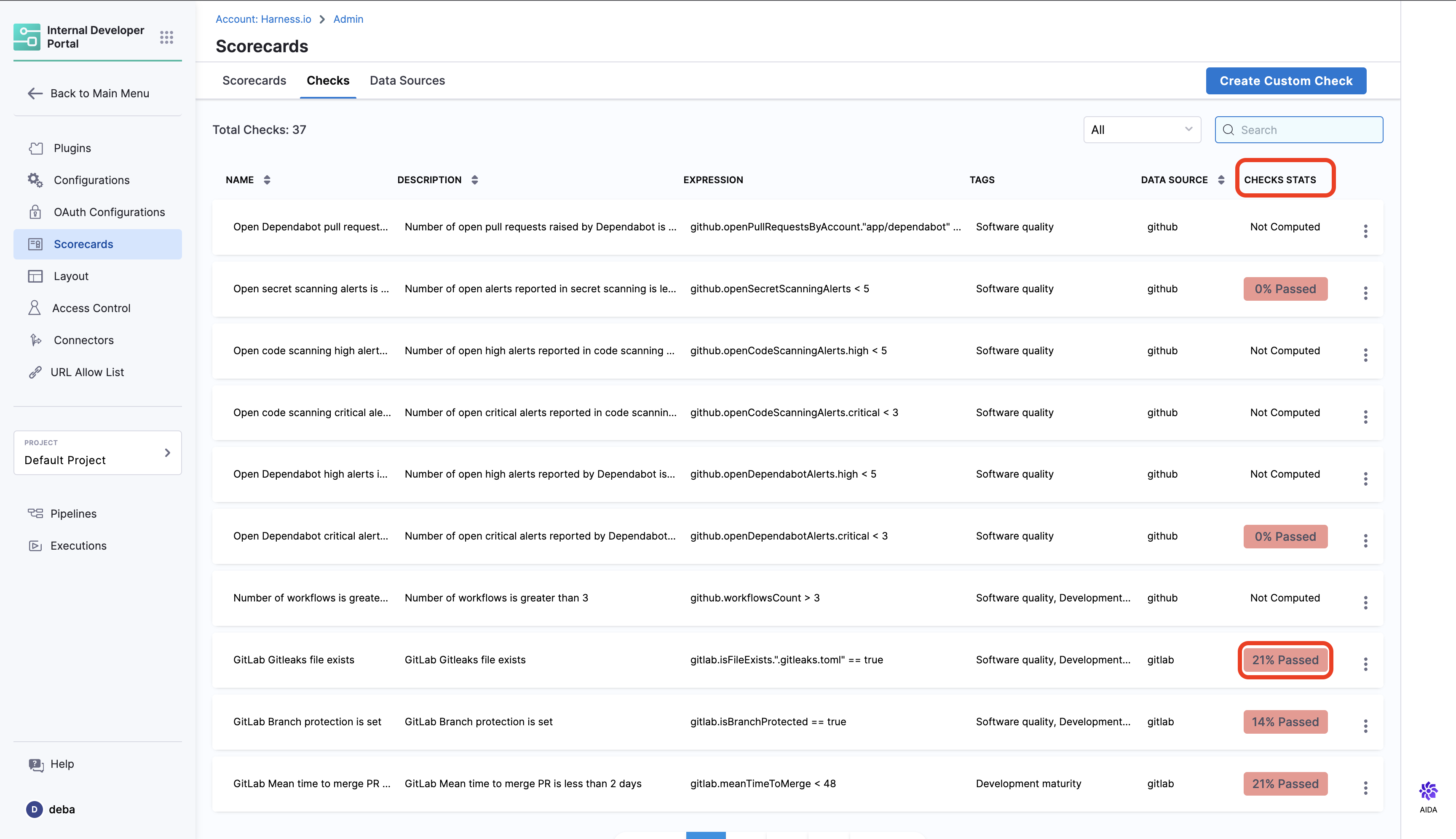
-
To have an overview of a single check and information on all the components it is applied, select the tab under Check Stats column for an individual check, it will redirect you to the overview page.
-
The overview page lists all the components on which the check is applied, and the graph helps you to track time-sensitive information on the components on which the check has passed, this can be used to track functions like migration and upgrades across your software ecosystem.
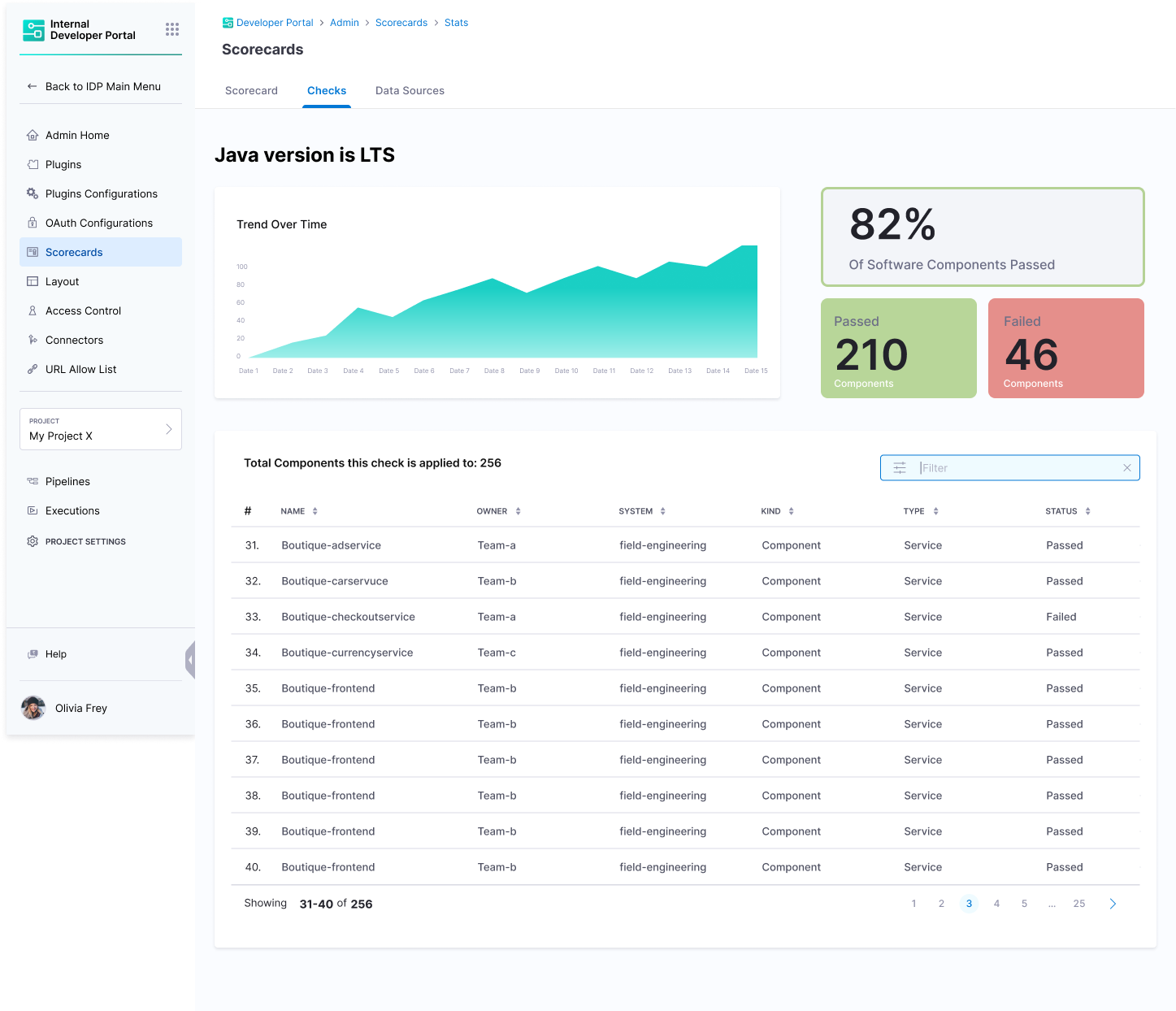
Follow the breadcrumbs on the top of the page to navigate across both the pages i.e., list of all checks and individual check overview page
